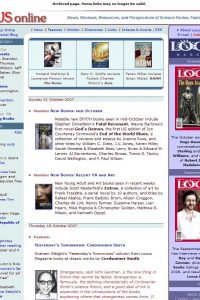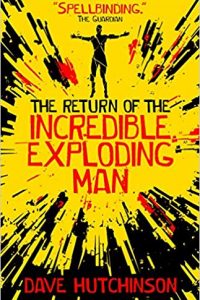Asunder by Kerstin Hall: Review by Liz Bourke
 Asunder, Kerstin Hall (Tordotcom 978-1-250-62543-4, $29.99, 432pp, hc) August 2024. Cover art by Greg Ruth.
Asunder, Kerstin Hall (Tordotcom 978-1-250-62543-4, $29.99, 432pp, hc) August 2024. Cover art by Greg Ruth.
Kerstin Hall writes sharp, fierce stories with precise and visceral prose, and with worldbuilding that possesses a keen sense for the weird, the haunting, the marvellous, and the twistedly strange. Asunder is only her fourth long-form work, her second novel (after 2021’s Star Eater and the novella duo The Border Keeper and Second Spear) and it is every bit as vividly compelling as I’ve come to expect from Hall – indeed, even more so.
Karys Eska is an independent deathspeaker, locked into an irrevocable compact with Sabaster, a terrifying and unforgiving otherworldly being. She won’t survive her compact being called in – not, at least, in any form recognisable as Karys Eska – and while she doesn’t know exactly when that will be, her time is running short.
Sabaster is an Ephirite, a godlike being. Forty years ago, the patriotic true believers now known as the New Favour made some kind of connection with the Ephirites in order to overthrow the Bhatuma (different godlike beings, these ones worshipped as gods) and the political order that their power supported. This is background to the events of the novel, the details and their relevance revealed with a deft and measured hand in a narrative that keeps its focus strongly centred on the personal: on Karys and the traps closing relentlessly in around her, and on the slow reveal of the elements of the past that went into making Karys who she is.
Karys makes her money, though not very much of it, by using her abilities to answer questions about the dead in the city she calls home. When a job finding out what happened to some smugglers goes suddenly, terribly, dangerously wrong, she stumbles over a dying stranger. Ferain Taliade is the last survivor of a slaughtered embassy, and he’s willing to pay what to Karys is a practically unimaginable amount of money for her help. In trying to preserve his life, she accidentally binds him in a way that she has no idea how to undo. This binding may be the death of them both, rather than Ferain’s salvation: He now exists in the material world only as Karys’s shadow, and as a voice in her head, and every bit of received wisdom suggests that this binding will eventually destabilise in a fatal fashion.
If Karys wants to undo the binding, survivably, she’ll have to travel to Ferain’s father, the only living specialist in the piece of magical technology that formed the basis of Ferain’s binding. But New Favour are pursuing her with deadly force for what she knows, or what they think she possesses, and she must keep Ferain secret from her terrifying eldritch master. Ferain’s homeland is on the other side of a dangerous borderland, and there’s no guarantee that both of them will survive a separation even if they reach their destination.
Her only ally is the bewilderingly helpful academic Winola Diasene – who Karys finds hard to trust because she dropped everything to try to help – and, later, a woman from Karys’s past who carries the favour of the last surviving Bhatuma, who’s tangled up in Karys’s old hurts in ways that complicate Karys’s present. But the Bhatuma’s interest in Ferain’s – and thus Karys’s – survival is no more benevolent than New Favour’s interest in their deaths.
Asunder strikes me as a novel interested in the consequences of desperate choices. All of the major characters have made choices that they were driven to by their circumstances: All of them have been, or are, trapped in some way by the consequences (foreseen or otherwise) of those choices. Many of those choices had no real good outcome. Karys – prickly, foul-mouthed, fighting with her last breath to be a survivor, determined to find some way around the compact with Sabaster that, she’s just learned, will lead to personal consequences even more horrifying than she’d previously imagined – is a deeply compelling protagonist. Her relationships with Ferain, with Winola, and with figures from her past – and the relationships of the other characters in the novel with each other – are all fraught and complicated things, filled with the silences, the secrets, and the partial understandings that undergird real relationships between real, complicated people.
Asunder is a thoughtful novel, complex and deep. It’s also a fast-paced, tense ride through a world that doesn’t hold back from glittering weirdness. Luxury travel in the bellies of dimension-hoping spiders, weapons that turn a person inside out, trains that run on rails made of light, drugs made from the corpses of dead gods, godlike beings with hundreds of wings and faces in their groins: Hall holds back neither wonder nor horror. But throughout, Hall’s skill and control of the narrative never falters. All the moving pieces slot into place, building into a nail-biting climax.
The ending leaves open as many questions as it answers, but although I would desperately love to see a sequel, Asunder is a complete narrative just as it is. A phenomenal one: I can’t recommend it highly enough.
Interested in this title? Your purchase through the links below brings us a small amount of affiliate income and helps us keep doing all the reviews you love to read!
Liz Bourke is a cranky queer person who reads books. She holds a Ph.D in Classics from Trinity College, Dublin. Her first book, Sleeping With Monsters, a collection of reviews and criticism, is out now from Aqueduct Press. Find her at her blog, her Patreon, or Twitter. She supports the work of the Irish Refugee Council and the Abortion Rights Campaign.
This review and more like it in the September 2024 issue of Locus.
 While you are here, please take a moment to support Locus with a one-time or recurring donation. We rely on reader donations to keep the magazine and site going, and would like to keep the site paywall free, but WE NEED YOUR FINANCIAL SUPPORT to continue quality coverage of the science fiction and fantasy field.
While you are here, please take a moment to support Locus with a one-time or recurring donation. We rely on reader donations to keep the magazine and site going, and would like to keep the site paywall free, but WE NEED YOUR FINANCIAL SUPPORT to continue quality coverage of the science fiction and fantasy field.
©Locus Magazine. Copyrighted material may not be republished without permission of LSFF.







